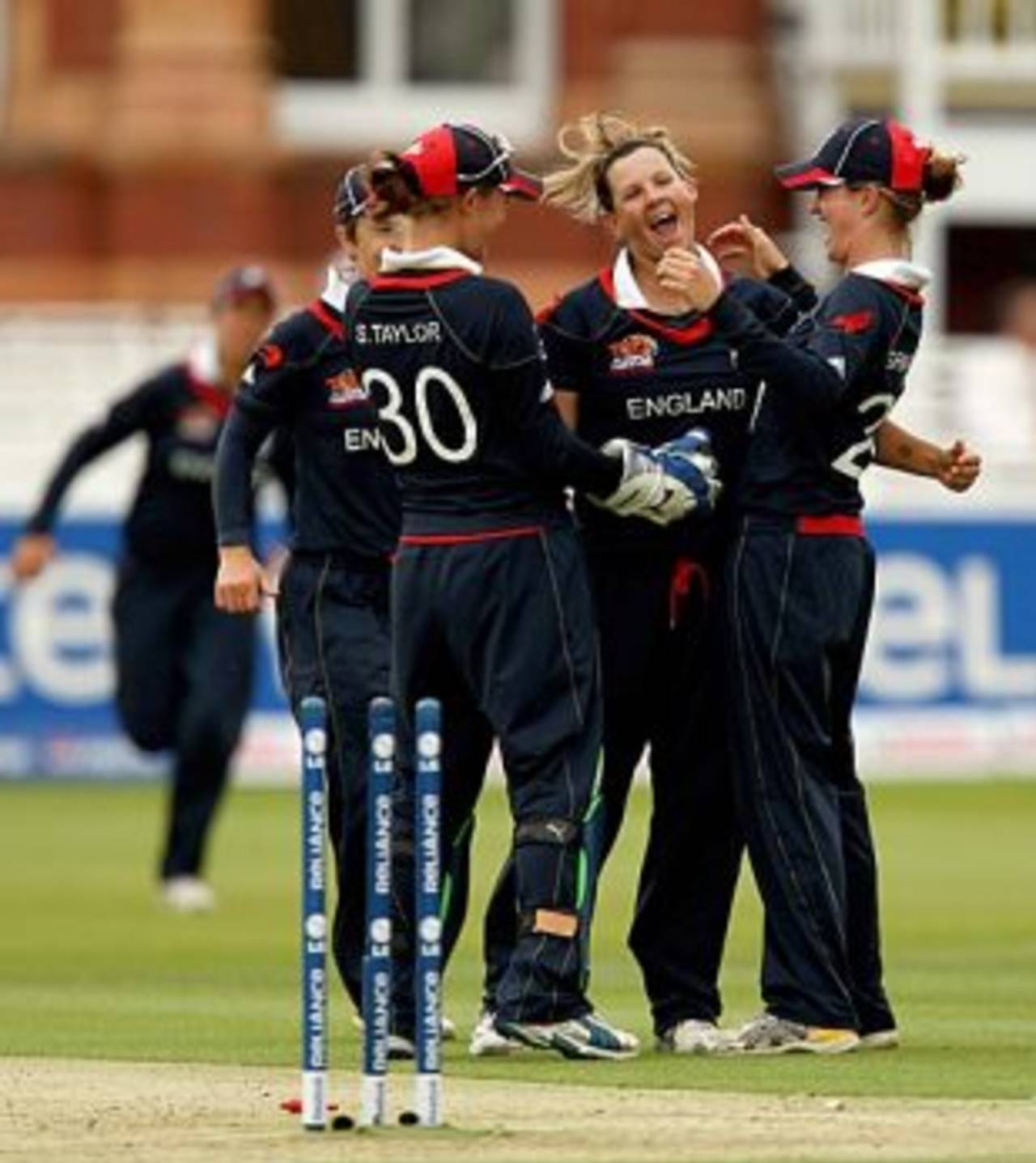Impressive England continue to widen the gap
The ominous question still lingers: is the win a sign that England are going to dominate cricket for the next decade, and what could that mean for the future of other nations?
Alice Dean
21-Jun-2009

More success for England, but the gap between them and other nations continues to widen • Getty Images
New Zealand coach Gary Stead put it best. His side's defeat to England
in Sunday's ICC World Twenty20 final was, he said, like the amateurs
playing the professionals. He only meant it figuratively, insofar as his team were outclassed on the day against a surprisingly clinical England. At last, the home
side's bowlers and fielders truly rose to the occasion in a way which
they hadn't throughout the rest of the tournament.
Stead was almost correct in the literal sense too, and therein lies a potential problem. The ECB has invested in English women's cricket for more than a decade now, but the tree naturally takes a long time to first take root and then bear fruit. Only in the last 18 months have England looked like world-beaters. Now they have the World Twenty20, the World Cup and the Ashes in their pockets, and better investment than ever before.
The ominous question goes thus: is this a sign that England women are
going to dominate cricket for the next decade or more, and if so, what
does that mean for the future of other nations?
England's women are, through Chance to Shine coaching contracts, the
nearest thing the women's game gets to professionals; the gulf
between them and the rest of the teams is in serious danger of
widening. They have beaten world No. 2 New Zealand seven times in their last
meetings, while India, the third-best in the world, have been their whipping girls for several years.
Only Australia - whose players have a contract-lite version of England's, but still have to work - have presented anything of a challenge. Players can attend the Academy in Brisbane and have funding through grants, but one wonders what's going to happen in the next few years when Karen Rolton, Shelley Nitschke and Lisa Sthalekar cart all their weighty experience off with them into the sunset.
New Zealand lost captain Haidee Tiffen earlier this year - she wrote
on Cricinfo that this was partly down to a lack of funding - while
players such as Suzie Bates and Sophie Devine are in eternal danger of
defecting to their other international sports of basketball (Bates)
and hockey (Devine). The players are desperately keen to get more
financial assistance and, given their record, certainly deserve it.
Investment can only make the powerhouses stronger.
England, partly due to the funding, have a well-gelled team who can
concentrate as much as they like on cricket. They have a young team
but one which is already very experienced and Charlotte Edwards - who
is the same age as Tiffen - intends to be around for many years yet.
And even though they have hardly played perfect cricket in either
tournaments this year, it's still been more than enough to reign
supreme.
So the future is certainly an issue. But at the same time, the
present is very much worth celebrating. England's women already beat
their men to an ICC trophy when they took the World Cup in March, the
first tournament under ICC regulations. They promptly did the double on Sunday and
are flying the flag in style.
The investment from the ECB continues to pay dividends and Edwards was
keen to note that the World Twenty20 success shows the 50-over tournament "was no
fluke". The victory is also a win for women's sport in England. While the
impact on the press may not be long-lasting in terms of a general lift
in column inches, the fact that writers and editors witnessed the
play at Trent Bridge, The Oval and Lord's for the first time might lead them to look more kindly on the women's game in the future.
The double-header staging of the tournament has been an unmitigated
success. While there were no upsets in any of the games, the
cricket was exciting and there were some superb performances, such as the West Indies
batsman Deandra Dottin's fastest international Twenty20 fifty against
Australia in Taunton, and New Zealand captain Aimee Watkins' 89 not out
in Nottingham against India. The most memorable game will long stand
out as Australia versus England at The Oval where Claire Taylor, the player of the tournament, stroked her side home in thrilling circumstances.
The ICC took a gamble on embracing the women's game, or perhaps it
would be more accurate to say a calculated risk, the women having
already been on the same stage as the men in domestic and
international games. And the decision paid off handsomely.
Women's cricket has arrived on the world stage, and nobody tried to
boo them off. Rather, they applauded a surprisingly entertaining new
act which represented good value for money, and has the chance to
shine again in the future.
With the format to be repeated next year in the Caribbean, the ICC can
both breathe a sigh of relief at the successful staging this time
around, but also give itself a pat on the back.
The ECB, too, should be applauded for setting the example - and now
it is hoped other countries can catch up with their view to a golden future.